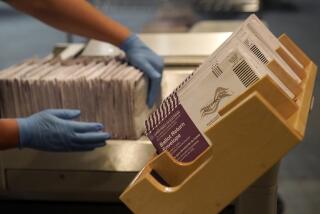For N.Y. and Nation, a Lesson From Which There’s No Return to Normal
NEW YORK — I wake to the sound of sobs coming through my hotel room wall and I lie with eyes closed, imagining the loss of the man next door.
Downstairs, another bewildered soul drags the weight of some great burden across the lobby.
“Are you all right?” I ask.
“My daughter was at the World Trade Center,” he says, and he keeps on, one foot in front of the other, destination unknown.
A week’s worth of images such as these haunt and inspire me as I take one last journey through New York before I begin the drive home across America. I climb the steps to the top of a double-decker tour bus and Manhattan rises up from centuries of toil, lifting the spirit skyward.
“Good morning ladies and gentlemen,” says Juan Lopez, 34, who flies the flags of Puerto Rico and the United States at home in Spanish Harlem. “I’m going to be your tour guide.”
Juan is actually going to give two tours. The tour of the city, which he’ll deliver into a microphone for a sparse audience of about a dozen tourists. And the tour of his heart, which he’ll whisper to me between stops at Macy’s, the Empire State Building, Grand Central Station, Greenwich Village, Soho, Chinatown and Little Italy.
“Due to the situation,” Juan announces, “we will not be going as far downtown as we normally would.”
Normally, you could get off at the World Trade Center and take the elevator to the top.
“For the sake of taste, I don’t say anything about the terrorism and all that,” Juan tells me. “But I gave tours in the World Trade Center, too. I had people calling me to see if I was in there when the planes hit. I still can’t fathom it. I’m lost.”
Beneath us, a man with a T-shirt that says “Bomb Him Now” walks past a couple locked in a long embrace. Amid talk of war against an unknown enemy, an enemy who may at this moment be sitting in the harbor with a missile, a kiss on the street speaks of eternity now.
“There used to be points where you had a nice view. You’d turn a corner, look down the street, and there were the towers. Now I got a gap in my tour. My heart bleeds for those people. Look at all these fliers all over the place. To tell you the truth, I haven’t looked at any of them. You know why? I’m afraid to see somebody I know.”
In Little Italy, a sidewalk vendor peddles sweatshirts that say “Proud to be an American” and “Evil Must be Punished.”
God help us if we think it’s as simple as wearing a shirt. Punish him, yes. Chase him, catch him, and feed him to scorpions.
But do so with an understanding of history. Do so with the knowledge that despite great humanitarian deeds around the world, we have blood on our hands, too, from Vietnam to the Middle East, and that we’ve created as many enemies as friends.
Do so with the understanding that the enemy is not an American in a turban or an American with a Koran.
The diversity is what makes us superior.
“You can eat from any part of the world here,” Juan tells the group as our bus chugs through the East Village.
Polish, Indian, Italian, Japanese, Thai, Afghan. A Muslim woman walks down the street, and on a corner building is a sign that says, “There is No God but 1. Allah Mohammed.”
“Up where I live, every other bodega is owned by Pakistanis,” Juan tells me. “So I don’t have a problem with Muslim people or the Muslim culture. What I have a hatred for is the fanatics. That’s who we’ve gotta go get, but then we all have to worry about what happens after that. Every time I go into a subway now, I’m thinking about nerve gas.”
The day of the attack, Juan raced downtown to get his 8-year-old son, Adam, at Our Lady of Sorrows School. Adam felt the ground shake, but he was OK.
You might have read somewhere that New York is OK, too, and beginning to return to normal, but the truth is a little different. Yes, people are back to work. Yes, well-heeled shoppers ogle glittering diamonds in glass cases at Tiffany & Co. on Fifth Avenue.
But the conversation has changed. The look in people’s eyes has changed. The sobbing will be coming through the wall for a long while, because the thing we’ve learned is not something from which you return to normal.
The thing we’ve learned in New York, a city of great generosity, spirit and sorrow, is that our lives are not our own.
*
Steve Lopez can be reached at steve.lopez@latimes.com
More to Read
Sign up for The Wild
We’ll help you find the best places to hike, bike and run, as well as the perfect silent spots for meditation and yoga.
You may occasionally receive promotional content from the Los Angeles Times.







